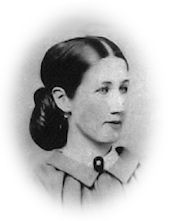December 2d.—Bragg begs to be relieved of his command. The army will be relieved to get rid of him. He has a winning way of earning everybody’s detestation. Heavens, how they hate him! The rapid flight of his army terminated at Ringgold. Hardie declines even a temporary command of the Western army. Preston Johnston has been sent out post-haste at a moment’s warning. He was not even allowed time to go home and tell his wife good-by or, as Browne, the Englishman, said, “to put a clean shirt into his traveling bag.” Lee and Meade are facing each other gallantly.[1]
The first of December we went with a party of Mrs. Ould’s getting up, to see a French frigate which lay at anchor down the river. The French officers came on board our boat. The Lees were aboard. The French officers were not in the least attractive either in manners or appearance, but our ladies were most attentive and some showered bad French upon them with a lavish hand, always accompanied by queer grimaces to eke out the scanty supply of French words, the sentences ending usually in a nervous shriek. “Are they deaf?” asked Mrs. Randolph.
The French frigate was a dirty little thing. Doctor Garnett was so buoyed up with hope that the French were coming to our rescue, that he would not let me say “an English man-of-war is the cleanest thing known in the world.” Captain said to Mary Lee, with a foreign contortion of countenance, that went for a smile, “I’s bashlor.” Judge Ould said, as we went to dinner on our own steamer, “They will not drink our President’s health. They do not acknowledge us to be a nation. Mind, none of you say ‘Emperor,’ not once.” Doctor Garnett interpreted the laws of politeness otherwise, and stepped forward, his mouth fairly distended with so much French, and said: ” Vieff l’Emperor.” Young Gibson seconded him quietly, “Á la santé de l’Empereur.” But silence prevailed. Preston Hampton was the handsomest man on board—”the figure of Hercules, the face of Apollo,” cried an enthusiastic girl. Preston was as lazy and as sleepy as ever. He said of the Frenchmen: “They can’t help not being good-looking, but with all the world open to them, to wear such shabby clothes!”
The lieutenant’s name was Rousseau. On the French frigate, lying on one of the tables was a volume of Jean Jacques Rousseau’s works, side by side, strange to say, with a map of South Carolina. This lieutenant was courteously asked by Mary Lee to select some lady to whom she might introduce him. He answered: “I shuse you,” with a bow that was a benediction and a prayer.
And now I am in a fine condition for Hetty Cary’s starvation party, where they will give thirty dollars for the music and not a cent for a morsel to eat. Preston said contentedly, ”I hate dancing, and I hate cold water; so I will eschew the festivity to-night.”
Found John R. Thompson at our house when I got home so tired to-night. He brought me the last number of the Cornhill. He knew how much I was interested in Trollope’s story, Framley Parsonage.
[1] Following the battle of Gettysburg on July 1st, 2d, and 3d, of this year, there had occurred in Virginia between Lee and Meade engagements at Bristoe’s Station, Kelly’s Ford, and Rappahannock Station, the latter engagement taking place on November 7th. The author doubtless refers here to the positions of Lee and Meade at Mine Run, December 1st. December 2d Meade abandoned his, because (as he is reported to have said) it would have cost him 30,000 men to carry Lee’s breastworks, and he shrank from ordering such slaughter.











